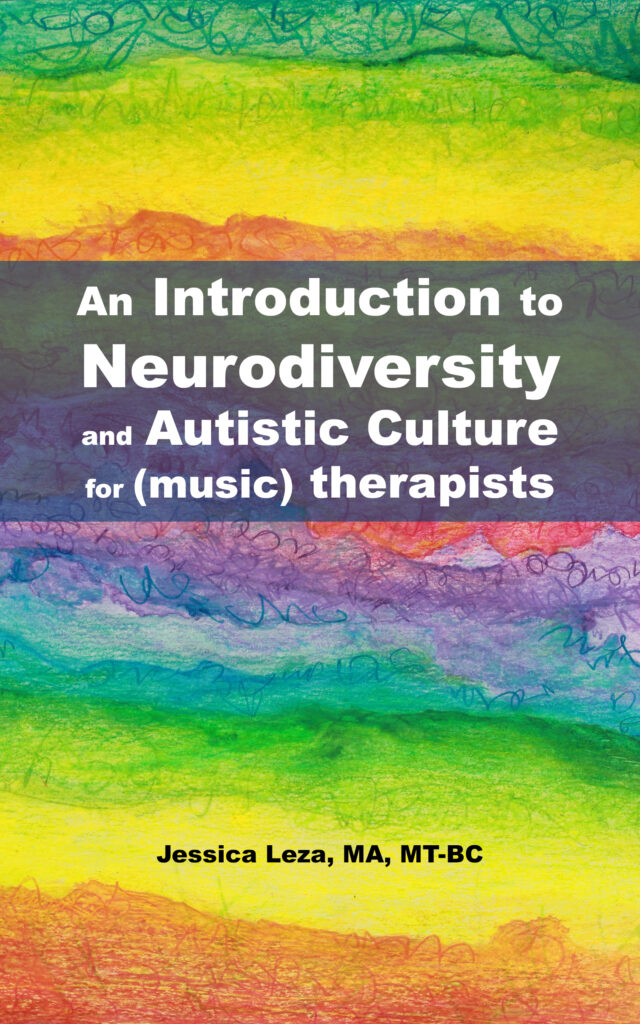La Migdalia Press announces the release of An Introduction to Neurodiversity and Autistic Culture for (Music) Therapists by Jessica Leza, MA, MT-BC, available June 2023 as an ebook and July 2023 as a trade paperback. Add it to your “to read” pile on GoodReads and give it a review once you’ve read it!
Download it now as a 239-page PDF through Etsy through La Migdalia for $34.99 here:
https://www.etsy.com/listing/1492591757/an-introduction-to-neurodiversity-and
Or get the 359-page trade paperback:
https://www.etsy.com/listing/1510338925/paperback-an-introduction-to?
The eBook is also available on Amazon for $49.99. Amazon costs more because their fees are so high. Purchasing through Etsy directly supports the author with better compensation.

This text introduces (music) therapists to Autistic culture, the neurodiversity movement, and ways this cultural knowledge can inform clinical practice and research. While this book is written by a music therapist and thus oriented toward the context of music therapy, many others will likely find the information highly relevant – including therapists, counselors, social workers, educators, caregivers, and curious laypeople. The neurodiversity paradigm and movement include a variety of neurotypes, but this text focuses predominantly on autism and autistic culture and strives to overcorrect for the epistemic injustice historically leveraged against autistic people by centering Autistic knowledge.
Nothing about us, without us.
This text draws extensively from autistic scholarship and advocacy; as a result, it is unashamedly autistic-affirming and oriented through the neurodiversity paradigm. This perspective provides therapists with useful information that can translate into improved clinical, pedagogical, and research practices. Acknowledging and understanding our preconceptions, assumptions, and biases can help us integrate new perspectives. Several times throughout this text, a series of self-reflection questions interject to assist the reader in exploring their experiences, thoughts, and feelings evoked by the material. These questions can be adapted to various settings, from private journaling for professional development to classroom or supervisory discussions.
Begin with an exploration of the terminology and basic concepts of the neurodiversity movement and Autistic culture, and Autistic perspectives on person-first language, functioning labels, the puzzle piece symbol, Autism Speaks, and autism awareness campaigns. Reconsider the standard approaches to therapy for autistic people by taking a deep dive into the history and criticisms of Applied Behavior Analysis (ABA). Contemplate what is meant by independence and the presumption of competence. Investigate topics that can impact therapy, such as masking and monotropism.
Move towards functional and appropriate goals by examining topics in communication (like AAC, echolalia, and scripting), socio-emotional skills (like the double empathy problem and alexithymia), and sensory-motor skills (like stimming, synesthesia, dyspraxia, and pain), with practical tips for addressing the music therapist’s role in sensory regulation.
Any discussion of Autistic culture requires addressing the always controversial matter of late diagnosis, misdiagnosis, and self-diagnosis, and this text dedicates a chapter to the matter. Readers then explore topics in autistic mental health (including trauma, burnout, eating disorders, substance use, depression and suicidality, and shutdowns and meltdowns), common co-occurring medical conditions or neurological conditions that are poorly understood (such as Ehlers-Danlos Syndrome, dysautonomia, and prosopagnosia), and intersectional insights (regarding gender and sexuality, race and ethnicity, religion, age, and family status). The final chapters provide practical tips for researchers and clinicians attempting to create autistic spaces.
Earn Continuing Music Therapy Education (CMTE) credits
Music therapists can use this text to earn up to 22 CMTEs by following directions in the CBMT Recertification Manual.
Read for free at your local library:
An Introduction to Neurodiversity and Autistic Culture for (Music) Therapists is available at the following libraries:
- University of Melbourne, Australia
- Western Sydney University, Australia
- Queen Margaret University, United Kingdom
- University of Bergen in Norway
- Wartburg College in Waverly, Iowa
Want to read for free? Request it at your local library – I love working with librarians to make this available!
About La Migdalia Press
La Migdalia Press is a small independent publisher, named after Jessica’s grandmother – Olga Maria Migdalia.